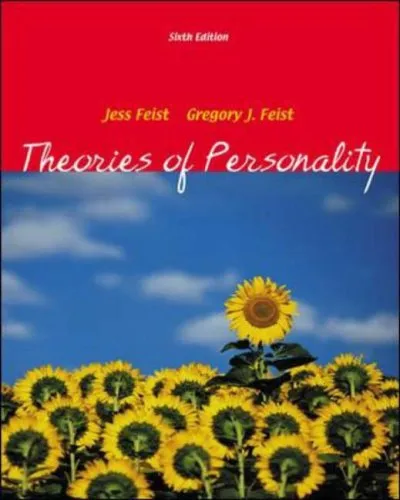Theories of Personality
4.5
Reviews from our users

You Can Ask your questions from this book's AI after Login
Each download or ask from book AI costs 2 points. To earn more free points, please visit the Points Guide Page and complete some valuable actions.Introduction to "Theories of Personality"
The study of personality has captivated humans for centuries, as we've sought to understand the nature of individuality and human behavior. "Theories of Personality," authored by Jess Feist and Gregory J. Feist, is a cornerstone resource for students, psychologists, and curious readers eager to explore the diverse approaches to understanding what makes individuals unique. This comprehensive text delves into the major theories developed by pioneers in the field, offering insights into the strengths, applications, and critiques of each model. It is designed to equip readers with not only theoretical knowledge but also practical tools for application in psychological practice, research, and everyday life.
Through its rigorous yet accessible structure, the book provides a thorough roadmap to the concepts that shape personality studies. Whether you're a student beginning your journey into psychology or a professional looking to reinforce your understanding of key theories, this book is a quintessential guide to understanding the complexities of personality.
Detailed Summary of the Book
"Theories of Personality" takes readers on a chronological journey through the development of personality psychology. It explores the foundational ideas and contributions of major theorists, including Sigmund Freud, Carl Jung, Alfred Adler, B.F. Skinner, Carl Rogers, and Abraham Maslow, among others. Each chapter begins with a brief biography of the theorist, providing context and understanding of how the life experiences of these intellectual giants shaped their ideas.
From Freud's psychoanalytic theory to Skinner's behavioral analysis, and from Maslow's hierarchy of needs to Rogers' humanistic approach, the book presents a balanced exploration of contrasting paradigms. Readers will become familiar with psychodynamic, trait, behavioral, cognitive, humanistic, and biological approaches, enabling them to appreciate how diverse methods contribute to the understanding of personality.
Additionally, the text balances theory with empirical evidence, putting the claims of each model to the test of data and application. Special attention is given to how cultural, biological, and social perspectives have influenced our understanding of personality over time. By the end of the book, readers will appreciate the interplay between different approaches and how these theories can work together to create a holistic understanding of the human psyche.
Key Takeaways
- The psychoanalytic roots of personality theory, focusing on the role of unconscious motivations and childhood experiences.
- Humanistic theories emphasizing individual growth, self-discovery, and self-actualization.
- Behavioral approaches focusing on observable actions and the impact of the environment on behavior.
- Cultural and biological influences on personality formation and expression.
- The integration of multiple theories to provide a comprehensive understanding of personality.
These key lessons not only deepen our understanding of personality psychology but also help frame practical ways to analyze human interactions in a real-world context.
Famous Quotes from the Book
"We are all creatures of our biology, but it is the environment that shapes how we express it."
"Personality is not fixed; it is a dynamic interplay of traits, experiences, and the context in which we live."
"Theories are not meant to compete but to complement one another, providing multiple lenses to understand human behavior."
Why This Book Matters
"Theories of Personality" holds an esteemed place in the field of psychology because it bridges the gap between abstract theory and empirical practice. By presenting the historical evolution of personality theories alongside modern research, it equips readers with a rounded perspective. The book is indispensable for professionals and students aiming to understand not just what personality is but how it can be studied, measured, and applied in diverse fields such as clinical psychology, organizational behavior, and education.
Furthermore, the book's emphasis on critical thinking and integration of multiple perspectives encourages readers to question, analyze, and refine their own views of personality. This intellectual rigor ensures that "Theories of Personality" remains a timeless resource, guiding generations of learners in their quest to uncover the intricacies of the human mind.
Free Direct Download
Get Free Access to Download this and other Thousands of Books (Join Now)
For read this book you need PDF Reader Software like Foxit Reader
Accessing books through legal platforms and public libraries not only supports the rights of authors and publishers but also contributes to the sustainability of reading culture. Before downloading, please take a moment to consider these options.
Find this book on other platforms:
WorldCat helps you find books in libraries worldwide.
See ratings, reviews, and discussions on Goodreads.
Find and buy rare or used books on AbeBooks.


